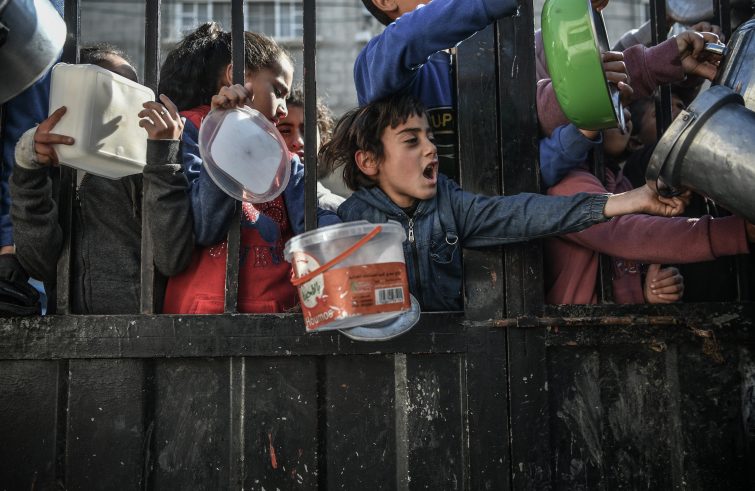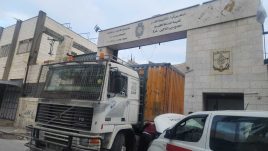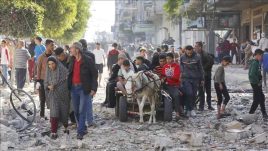
The Middle East is on the brink of a “full-scale regional conflict. Ending the hostilities in Gaza would significantly defuse tensions across the region”, said UN Secretary General Antonio Guterres, addressing the UN Security Council on Thursday. Guterres also said that Gaza is facing a “humanitarian hellscape”, with 1.7 million people forced to flee from the north to seek refuge in the south, living in makeshift tents or temporary shelters. As tensions rise over a possible invasion of Rafah by Israeli troops, the number of dead and wounded in the Palestinian enclave is soaring. Hamas claims 34,000 dead and an estimated 77,000 wounded. According to UNICEF Communications Specialist Tess Ingram, “a child is killed or injured every ten minutes in Gaza” as a result of the war. There are at least 12,000 injured, almost 70 every day. Some 14,000 children have died in six months of war. UNICEF also points out: “84% of all health facilities and 62% of housing units in the Strip have been damaged or destroyed. Fifty-seven percent of the water infrastructure is out of service.” Solid waste management has become another urgent need in Gaza, as denounced by the United Nations Development Programme (UNDP), which says that if left unaddressed, this emergency will exacerbate the suffering and health conditions of the population.
 The gravest fears. In the meantime, a humanitarian aid shipment has reached Gaza from Kuwait, destined for the Catholic parish where some 600 displaced Christians have taken shelter. It was delivered by the Red Crescent, the parish reported. This was confirmed to SIR by Sister Nabila Saleh, a member of the congregation of the Sisters of the Rosary of Jerusalem, originally from Egypt. She left the Strip a few days ago due to poor health. “There have been deliveries of flour, which will allow the bakery to resume its bread-making activities.” The nun spoke with the parish priest, Father Youssef Asaad, who remains inside the parish compound (the parish priest, Father Gabriel Romanelli, who was outside the Strip when the war broke out on 7 October, has not been able to return, Ed.’s note) “All the displaced people sheltering in the parish are worried about the news of the Iranian attack, especially about a possible escalation of the conflict. But the biggest worry,” says the nun, “is how to survive the war in Gaza. The bombardments and shortages of food, water and medicine are taking their toll on an exhausted population. Many people are trying to leave the Strip, including several Christians. Gaza is in danger of seeing all its Christian faithful leave, and God knows how vital the Christian presence is in this strip of land,” she said, clearly referring to the material support provided by the local Church in synergy with Caritas Jerusalem, with mobile clinics, schools, care for the disabled and the elderly. Until 7 October, Sister Nabila served as the principal of one of the largest educational institutions in the Strip, a Catholic school with some 1,300 students of all ages, the vast majority of them Muslim. “The school is no longer standing,” she says. “It was bombed and destroyed. We hope to rebuild it, but we don’t know how or when. It will take years for Gaza to get back on its feet.”
The gravest fears. In the meantime, a humanitarian aid shipment has reached Gaza from Kuwait, destined for the Catholic parish where some 600 displaced Christians have taken shelter. It was delivered by the Red Crescent, the parish reported. This was confirmed to SIR by Sister Nabila Saleh, a member of the congregation of the Sisters of the Rosary of Jerusalem, originally from Egypt. She left the Strip a few days ago due to poor health. “There have been deliveries of flour, which will allow the bakery to resume its bread-making activities.” The nun spoke with the parish priest, Father Youssef Asaad, who remains inside the parish compound (the parish priest, Father Gabriel Romanelli, who was outside the Strip when the war broke out on 7 October, has not been able to return, Ed.’s note) “All the displaced people sheltering in the parish are worried about the news of the Iranian attack, especially about a possible escalation of the conflict. But the biggest worry,” says the nun, “is how to survive the war in Gaza. The bombardments and shortages of food, water and medicine are taking their toll on an exhausted population. Many people are trying to leave the Strip, including several Christians. Gaza is in danger of seeing all its Christian faithful leave, and God knows how vital the Christian presence is in this strip of land,” she said, clearly referring to the material support provided by the local Church in synergy with Caritas Jerusalem, with mobile clinics, schools, care for the disabled and the elderly. Until 7 October, Sister Nabila served as the principal of one of the largest educational institutions in the Strip, a Catholic school with some 1,300 students of all ages, the vast majority of them Muslim. “The school is no longer standing,” she says. “It was bombed and destroyed. We hope to rebuild it, but we don’t know how or when. It will take years for Gaza to get back on its feet.”
 Waiting in line for a visa at Rafah. Rashid (fictitious name, Ed.’s note), a nurse at a hospital in southern Gaza, one of the few still partially operational, shared his concerns. He managed to reach Egypt a few days ago for a refresher course and is now trying to get his family out: “If I don’t succeed, I will come back. If I have to die, I will die with my family and in my own country. Everyone is afraid that Rafah will be invaded,” he told SIR. “There are constant bombings and attacks. Buildings continue to collapse, displacing families and forcing them to shelter in the wreckage or in makeshift shelters. Hospitals are unable to provide adequate care for the sick and wounded, lacking everything from bandages to syringes and medicines. Many doctors and specialists have left the Strip for Egypt. There is no safe place to stay in Gaza.” “Many Gazans are waiting to leave at the Rafah crossing. To get a visa you have to pay huge sums of money that people here cannot afford. The only ones leaving Gaza today are those who have received money from friends or relatives abroad, collected through fundraising campaigns.”
Waiting in line for a visa at Rafah. Rashid (fictitious name, Ed.’s note), a nurse at a hospital in southern Gaza, one of the few still partially operational, shared his concerns. He managed to reach Egypt a few days ago for a refresher course and is now trying to get his family out: “If I don’t succeed, I will come back. If I have to die, I will die with my family and in my own country. Everyone is afraid that Rafah will be invaded,” he told SIR. “There are constant bombings and attacks. Buildings continue to collapse, displacing families and forcing them to shelter in the wreckage or in makeshift shelters. Hospitals are unable to provide adequate care for the sick and wounded, lacking everything from bandages to syringes and medicines. Many doctors and specialists have left the Strip for Egypt. There is no safe place to stay in Gaza.” “Many Gazans are waiting to leave at the Rafah crossing. To get a visa you have to pay huge sums of money that people here cannot afford. The only ones leaving Gaza today are those who have received money from friends or relatives abroad, collected through fundraising campaigns.”
Surviving. Iran’s attack on Israel? “The people of Gaza have other, more pressing concerns. They are worried about where to sleep, about getting food and, above all, staying alive and supporting their loved ones. All they want is to stay alive. We don’t care about the situation in Iran, in Russia, in Ukraine.
We want it all to end soon, so that we can return to our homes, rebuild what we can, and live in safety, if that is ever possible.
We want our children to go back to school, we want healthcare, we want our elderly to live in safety. What happens outside the Strip is not our concern – he concludes. We need so much help, including psychological support for our children, so that we can look to the future with some hope. We have nothing left, no homes, no jobs, no health care, no schools, nothing, they have even robbed us of our future.”











